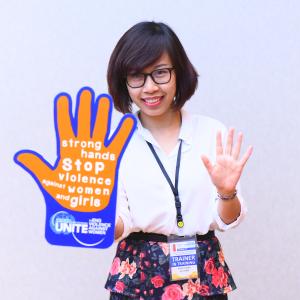Increased focus on women needed in National HIV response
01 November 2016
- Ha Noi, 1 November 2016 – Women in Viet Nam may be increasingly vulnerable both to HIV infection and – particularly - the impacts of HIV, leading experts to call for greater emphasis on gender mainstreaming in the national HIV response.
In 2014 an estimated 240,000 adults were living with HIV in Viet Nam. Although the number of new infections had remained high at 14,000 a year, the proportion of women increased from one in four in 2007 to one in three by 20141. At the same time, a 2010 study indicated that more than half of women living with HIV reported that their only possible exposure to HIV had been through sexual relations with a husband or long-term male partner who engaged in high-risk behaviour.2
Addressing a 5 day workshop on the importance of mainstreaming Gender into HIV work, Ms. Shoko Ishikawa, UN Women Country Representative says “Women and girls living with HIV now face extraordinary, and often intersecting, forms of discrimination. Many face losing their home, custody of their children and property and inheritance rights. Women who engage in sex work, transgender women and women who use drugs also suffer high levels of discrimination. With an increasing proportion of new infections occurring among women it is now time to take serious action. Women’s participation in the AIDS response is critical and we need to develop programmes which especially address their particular experiences and needs”.
Recent reviews of the national HIV response and the monitoring and evaluation framework from a gender perspective highlighted a lack of gender knowledge and understanding amongst key stakeholders. There was a lack of knowledge of how the needs of women who are living with HIV and women in Key Populations can be taken into account in planning and programming. The response currently focuses heavily on pregnant women and prevention of mother to child transmission. This also resulted in no mention on gender in HIV National Work Plan 2016-2020 and a lack of gender and age disaggregated data on HIV reports including related Transgender persons.
Dr. Pham Duc Manh, Deputy General Director of Viet Nam Authority of HIV/AIDS Control (VAAC) says, “There is limited awareness and legal and policy framework which focus on women and girls living with HIV at the moment. Only very few existing indicators are women focus and the monitoring and evaluation system focus on quantitative data and case studies, which provided quite limited insights to the effects of the response on women and more generally, the quality and effectiveness of programme. Together with the lack of gender knowledge, these are becoming major barriers to effective national response to HIV”.
Sexual transmission – between men who have sex with men, sex workers and their clients and between serodiscordant heterosexual partners – currently accounts for nearly 48% of all new HIV infections in Viet Nam (up from around 10% in 2000).3
Meanwhile, only 40 per cent of young women have accurate knowledge about preventing the sexual transmission of HIV,4 and many such young women and girls also lack access to sexual and reproductive health services.5 Female sex workers, women who use drugs and Transgender women face multiple forms of stigma and discrimination including legal policy barriers, high level of violence and other forms of social marginalisation. This puts women in Key Population at greater risk of contracting HIV. Women also lack access to formal/stable employment and shoulder the primary burdens of care and other household responsibilities, increasing their financial and social instability and meaning that they are disproportionately affected by the realities of their own or family members’ HIV status and carry a disproportionate portion of HIV care without being compensated.
All over the world, HIV response and gender equality are integral to the Sustainable Development Goals adopted in 2015, which is a mandate to collaborate for global collective action over the next 15 years. In June this year, the General Assembly also adopted 2016 Political Declaration on Ending AIDS which set out the target to be achieved by 2020 to end the AIDS epidemic by 2030.
The Viet Nam Authority of HIV/AIDS Control is now revising the HIV National Work Plan 2016 – 2010 and preparing for the development of 2017 Planning Guideline which guides central and provincial levels to develop 2017 annual work plans. Therefore, now, it is a crucial time to ensure gender priorities are reflected in both Plans and other HIV programmes and policies in order to address gender gaps in HIV response from 2017 and beyond. It is strongly recommended that the government establish a strong legal and policy framework to eliminate discrimination against women who are living with HIV and at greater risk of HIV for effective HIV prevention, treatment and care. These will be key to having an efficient and effective implementation of the HIV programmes nationwide.
The workshop led by Viet Nam Authority of HIV/AIDS Control, will run for five days, facilitated by experienced experts including HIV and gender Regional Advisors from UN Women and World Health Organization, and supported by UNAIDS and FHI360 USAID/SHIFT.
1 Viet Nam Authority of HIV/AIDS Control (VAAC). Document No. 15/BC-BYT: Annual Report on the HIV/AIDS Programme 2014. 2015.
2 Viet Nam Administration of AIDS Control. Viet Nam AIDS Response Progress Report 2014. 2014.
3 Ministry of Health. Attached with Document No. 797 / AIDS-KH dated 17/08/2015: National Work Plan on HIV/AIDS Prevention and Control for the Period Between 2016-2020
4 Ministry of Health, GSO (General Statistics Office), WHO (World Health Organization) and UNICEF (United Nations Children’s Fund). 2010. Survey Assessment of Vietnamese Youth Round 2.
5 UNFPA, Advocacy Brief: Unmet need for contraception and implication for Viet Nam, 2013.





